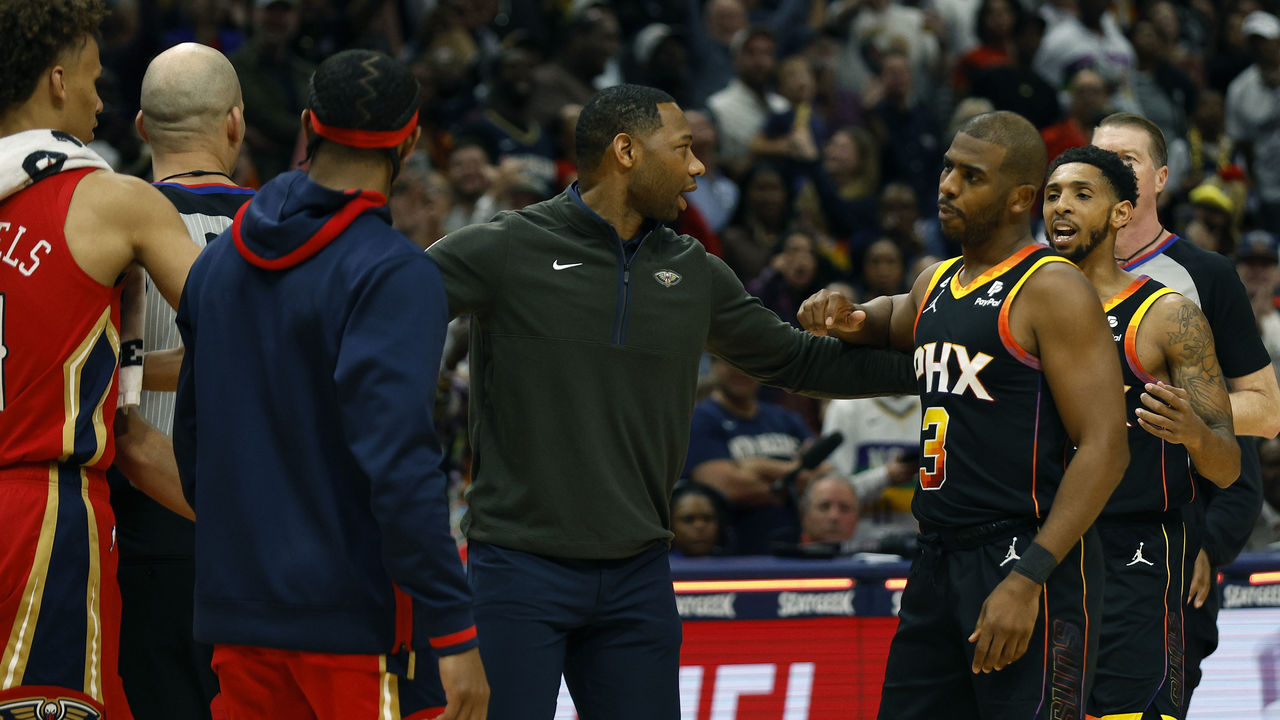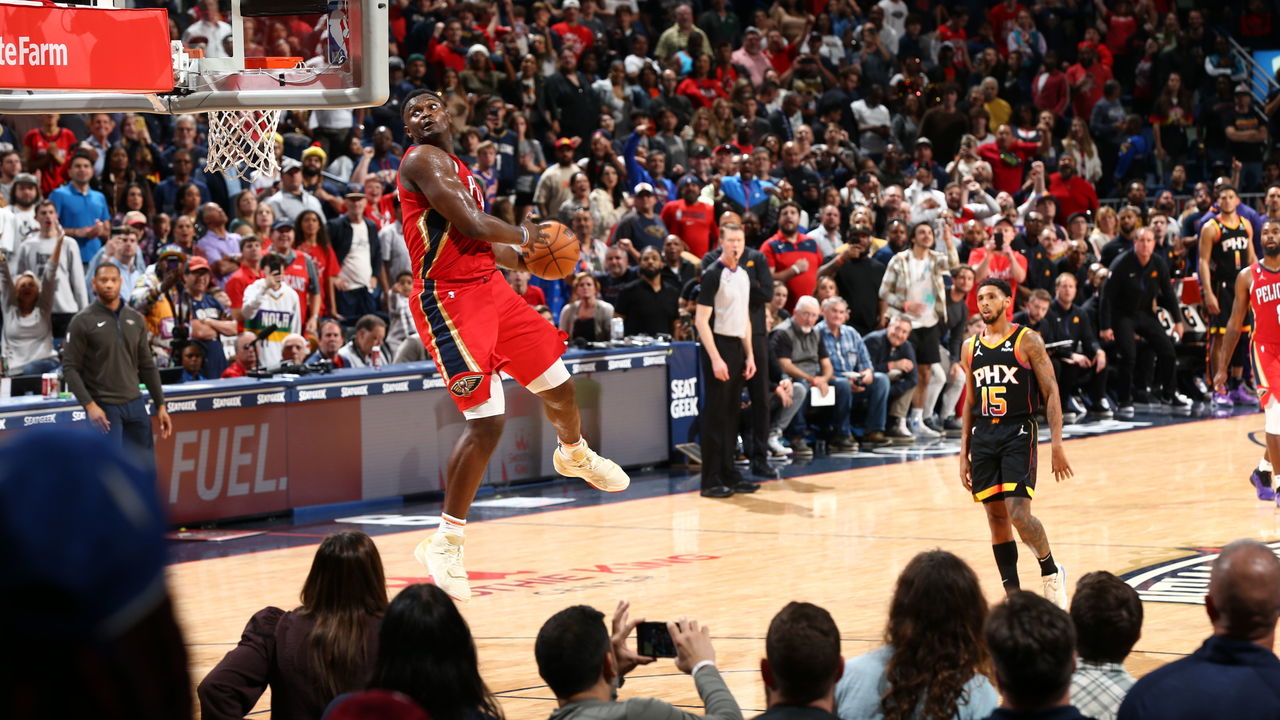Sour grapes: Unwritten rules are hypocritical, which suits the Suns
A loud but otherwise meaningless basket scored in New Orleans last Friday has become the dunk heard around the world after the Phoenix Suns cried foul.
Those who believe Zion Williamson wronged the Suns with his last-second jam will tell you he broke one of basketball's unwritten rules: that you don't run up the score with the shot clock turned off at the end of a guaranteed victory. But given the setting, it's easy to understand how the big man got swept up in the moment.
A rivalry between the Pelicans and Suns began to percolate last spring when New Orleans pushed top-seeded Phoenix to six games in a hard-fought first-round playoff series. Williamson, as he was for the entirety of last season, was sidelined for that series. But with the Pelicans' franchise star back in the fold this year, New Orleans has raced to the top of the Western Conference.
The Pelicans leapfrogged Phoenix to get there, so when the two teams clashed for the first of three matchups in nine days, fireworks were expected between two top-four teams in the West. Sure enough, with the Pelicans up by nine points in the game’s dying seconds, Williamson provided those pyrotechnics with a 360 dunk that sent the home crowd into a frenzy.
With no one between him and the rim, can you blame the 22-year-old for deciding against dribbling out the clock? Williamson giving the fans what they wanted at that moment was a much better showcase of the NBA's exhilarating product than dribbling out the clock to protect his opponents' feelings.

It's also rich that the Suns, of all teams, are the aggrieved party. Chris Paul - whose legendary career has been laced with gamesmanship over sportsmanship - appeared to elbow Pelicans rival Jose Alvarado in the neck while the young guard celebrated his teammate's dunk. Three weeks ago, Suns center Deandre Ayton and star guard Devin Booker taunted Austin Reaves while the Lakers guard lay on the court following a Booker flagrant foul. Williamson merely dunked a basketball.
If the Suns wanted to do something about it, they had their chance in a rematch 48 hours later. They didn't take it. At this point, Phoenix has cemented its reputation as a front-running team with a bark worse than its bite.
Last week, the Suns played a Mavericks team that embarrassed them in Game 7 of last season's Western Conference semifinals and lost by 19 despite coming into the contest once again atop the West. Two nights later, Phoenix was run off its home floor in a 27-point loss to the Celtics. Then came the back-to-back losses to New Orleans, followed by a double-digit loss to the lowly Rockets, during which Ayton and Cam Payne joined the injured Booker and Cameron Johnson on the sidelines.
The sliding Suns have bigger internal issues to worry about than how opponents are punctuating their victories. The unwritten rules are the last bastion for teams that aren't good enough, an attempt to save face by pointing fingers in the other direction.
On the same night Williamson enraged the Suns, Rudy Gobert rankled his former team in Utah by scoring in a similar end-of-game situation.
Jazz guard Malik Beasley, who was part of Minnesota's outgoing trade package for Gobert this past summer, called the big man's late basket "disrespectful." But watch the buildup to Gobert's bucket, and you'll see that Beasley's Jazz were still aggressively trying to force a turnover despite being down eight with 12 seconds left. The Jazz broadcast team lauded them for continuing to play hard until the end.
Should the team cruising to victory not be allowed to play as hard as the team already facing certain defeat? This is where the very fabric of sports' unwritten rules comes apart at the seams.
In baseball, teams up big in late-game situations are expected to be less aggressive at the plate and on the base paths. But is the losing team not still trying to rally? Would the team trailing not capitalize on any opportunity to get back in the game? If the winning team is expected to ease up at some point, then why not just institute a mercy rule as in Little League?
Many of the same supposed sportsmanship purists who subscribe to baseball's unwritten rules also believe in the twisted justice of purposely throwing at defenseless batters as revenge for some perceived slight. The entire system is upheld by hypocrisy.
In soccer, players are expected to abstain from excessively celebrating goals scored against clubs they once played for lest they offend their former employer and its rabid fans. There's no unwritten rule to govern how boisterous the former team can get or how loud those fans can cheer, however, if they beat the former teammate. The display of respect in the unwritten rules is always a one-way street.

Pro sports are supposed to be about competition and entertainment. As long as a player's not hurting anyone or being purposefully offensive, let them play. Let them have fun, especially players like Zion Williamson, who know all too well how precious and fleeting healthy and successful moments on an NBA court are.
If you're a fan, stop clutching your pearls over unwritten rules you only seem to care about when the team you root for is the one that's been embarrassed. And if you're a player or rival team, either do something about it within the confines of the game you're losing or stop whining.
The Suns don't seem capable of doing either.
Joseph Casciaro is theScore's senior content producer.
HEADLINES
- Celtics' Brown 'grateful' to receive MVP endorsement from LeBron
- LeBron becomes 1st player with 43K regular-season points
- Brown, Pritchard lead Celtics' thrashing of Lakers
- Shorthanded Thunder hit 21 3-pointers to end Cavs' 7-game win streak
- LeBron, Riley ponder what might've been if Heat partnership lasted longer